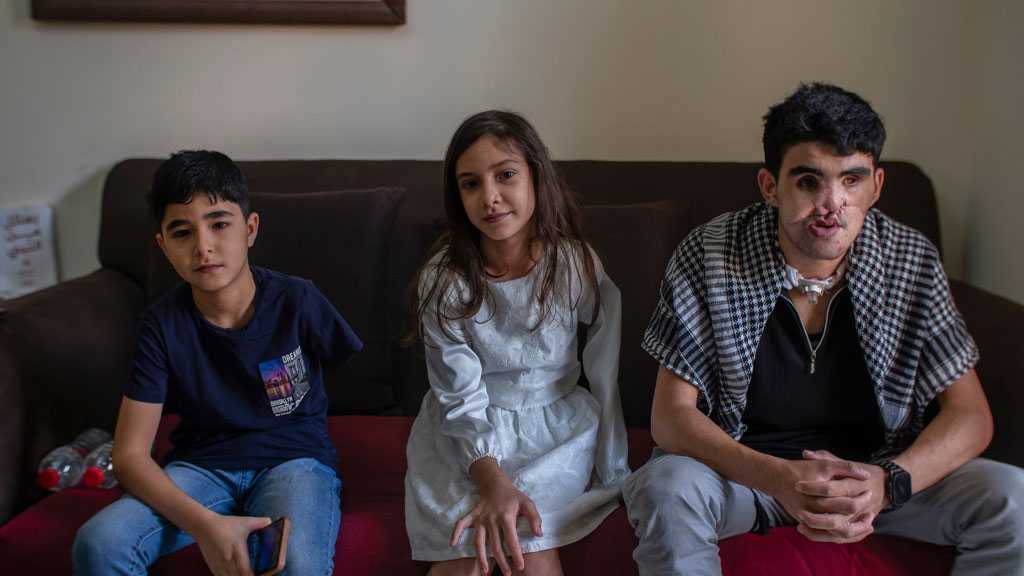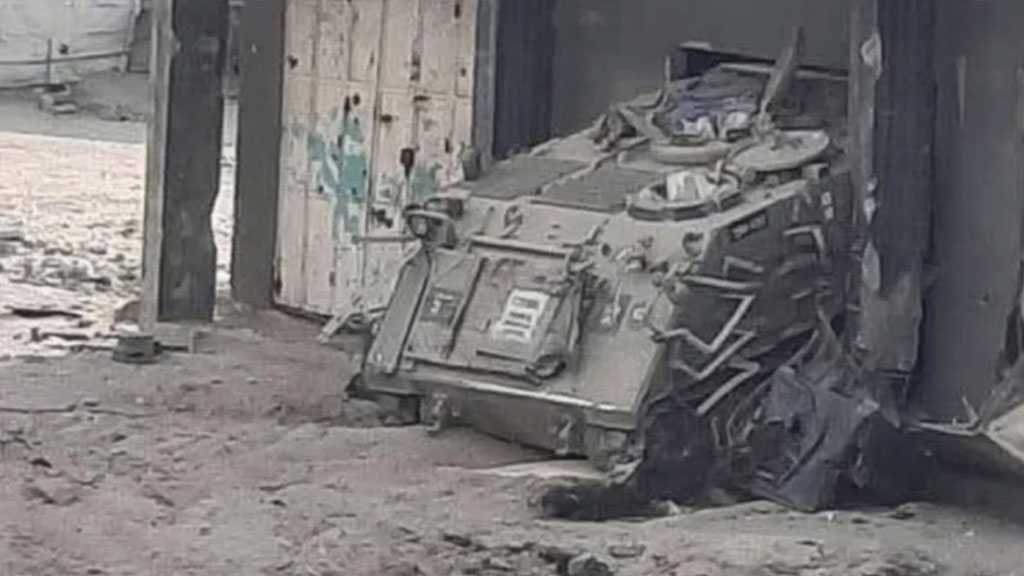Palestinian workers & land exploited by Zionist occupation-settlements

Source: The Electronic Intifada, 6-01-2008
By Adri Nieuwhof
In August, the Business and Human Rights Resource Centre, the international watchdog organization, asked three 'Israeli' companies to respond to a report by an 'Israeli' non-governmental organization that protested the treatment of Palestinian workers at West Bank settlement industrial parks. Kav LaOved, which is concerned with the rights of migrant and Palestinian workers employed in 'Israel' and 'Israel's' illegal settlements, reported on the rising number of claims by Palestinian workers employed in West Bank settlements following an October 2007 'Israeli' high court ruling that the country's labor laws applied in the settlements.
Amongst the companies whose labor practices were criticized in the Kav LaOved report was Royalnight, a textile manufacturer owned by Royalife. In 2003, Royalife established a factory in the Barkan Industrial Park located near the Ariel settlement in the northern West Bank. Royalnight's sheet sets, bed skirts, quilted blankets, and decorated pillows are exported to and marketed in the United States and Europe. According to Kav LaOved's report, Palestinian workers who come from all over the West Bank have to work under poor health and safety conditions at Royalnight's textile plant. To evade liability, work permits are issued under the name of a different employer, and workers employed through a Palestinian contractor are paid less.
In 1999, the United Nations Economic and Social Council criticized the practice of 'Israeli' companies, including most of those operating in the Barkan Park, moving their factories to the West Bank to escape the higher health and environment standards applicable in 'Israel'. Kav LaOved states in its report that the Royalnight textile plant is no different: "Health and safety standards are poor, the working environment is noisy and the air is full of fabric dust. Most work is carried out standing, and the workers take five minutes breaks at their own expense."
The report adds: "[Workers] complain of exposure to dangerous cleaning substances and of working near cutting machines lacking safety devices. The company does not employ a Health and Safety official and the workers have received no instructions or cautions regarding possible dangers of operating machinery."
In an unsigned letter, Royalife replied to the Business and Human Rights Centre's query and the allegations raised by Kav LaOved: "All complaints are not correct. While Western Europe and the United States moved the industry to countries like Pakistan, India, China, with much lower labor costs, we tried to keep the textile industry in our region, enabling income to the people who live in the area."
However, Kav LaOved writes that Barkan Industrial Park is "away from the eye of the law. 'Israeli' employers have found ways of evading the high court ruling by for instance issuing pay slips with false attendance reports. The normal practice is to register fewer working days than those actually worked, so it appears that the minimum wage is being paid." According to the report, "workers employed through a Palestinian contractor are paid between six and eight shekels an hour, whereas workers employed directly by the factory are paid between nine and 11 shekels an hour." At the time of writing, 3.5 shekels was the approximate equivalent to one US dollar.
Palestinian workers from the occupied territories were once widely employed inside 'Israel'. But following the Oslo Accords, 'Israel' has dramatically reduced the number of work permits issued to Palestinians from the West Bank and Gaza Strip. Since April 2006, Gazans are no longer able to receive work permits for employment inside 'Israel' or its West Bank settlements at all. Those in the West Bank who do receive the permits find that they are only valid for three months at a time and 'Israel's' severe movement restrictions make it difficult for even permit-holders to reach their places of employment.
'Israel's' closures have significantly contributed to rampant unemployment and underemployment in the occupied West Bank and Gaza Strip, where 33 percent and 80 percent of the population, respectively, is dependent on international food assistance, according to an April 2008 report by the International Labour Organization. The World Bank has identified 'Israel's' closure and movement restriction regime as a leading cause of the rapid deterioration of the Palestinian economy.
The dire economic situation means more Palestinians are forced to seek work in 'Israel's' illegal settlements, where they are vulnerable to exploitation. Palestinian human rights organizations have reported that Palestinian workers are coerced into collaboration with 'Israeli' security services to receive the permits necessary to work in the settlements and inside 'Israel'.
So far, Royalnight has gone unpunished for its profitable exploitation of Palestinian workers in its settlement manufacturing plant. The goods it exports are likely marked as "Made in 'Israel'" even though the Barkan Industrial Park where its sewing factory is located is built in violation of international law on stolen Palestinian land. However, there is a growing movement to hold companies like Royalife accountable. Earlier this year Barkan Wineries terminated its lease at the Barkan Industrial Park and moved its operations inside the internationally-recognized boundary between the West Bank and 'Israel', following a campaign against the company's settlement operations that tarnished its image (the company, however, still owns a vineyard in the occupied Syrian Golan Heights). As the international boycott, divestment and sanctions campaign against 'Israel's' rights violations increasingly gains momentum, the exploitation of Palestinian labor by 'Israeli' companies operating on occupied land will surely come under further scrutiny.
By Adri Nieuwhof
In August, the Business and Human Rights Resource Centre, the international watchdog organization, asked three 'Israeli' companies to respond to a report by an 'Israeli' non-governmental organization that protested the treatment of Palestinian workers at West Bank settlement industrial parks. Kav LaOved, which is concerned with the rights of migrant and Palestinian workers employed in 'Israel' and 'Israel's' illegal settlements, reported on the rising number of claims by Palestinian workers employed in West Bank settlements following an October 2007 'Israeli' high court ruling that the country's labor laws applied in the settlements.
Amongst the companies whose labor practices were criticized in the Kav LaOved report was Royalnight, a textile manufacturer owned by Royalife. In 2003, Royalife established a factory in the Barkan Industrial Park located near the Ariel settlement in the northern West Bank. Royalnight's sheet sets, bed skirts, quilted blankets, and decorated pillows are exported to and marketed in the United States and Europe. According to Kav LaOved's report, Palestinian workers who come from all over the West Bank have to work under poor health and safety conditions at Royalnight's textile plant. To evade liability, work permits are issued under the name of a different employer, and workers employed through a Palestinian contractor are paid less.
In 1999, the United Nations Economic and Social Council criticized the practice of 'Israeli' companies, including most of those operating in the Barkan Park, moving their factories to the West Bank to escape the higher health and environment standards applicable in 'Israel'. Kav LaOved states in its report that the Royalnight textile plant is no different: "Health and safety standards are poor, the working environment is noisy and the air is full of fabric dust. Most work is carried out standing, and the workers take five minutes breaks at their own expense."
The report adds: "[Workers] complain of exposure to dangerous cleaning substances and of working near cutting machines lacking safety devices. The company does not employ a Health and Safety official and the workers have received no instructions or cautions regarding possible dangers of operating machinery."
In an unsigned letter, Royalife replied to the Business and Human Rights Centre's query and the allegations raised by Kav LaOved: "All complaints are not correct. While Western Europe and the United States moved the industry to countries like Pakistan, India, China, with much lower labor costs, we tried to keep the textile industry in our region, enabling income to the people who live in the area."
However, Kav LaOved writes that Barkan Industrial Park is "away from the eye of the law. 'Israeli' employers have found ways of evading the high court ruling by for instance issuing pay slips with false attendance reports. The normal practice is to register fewer working days than those actually worked, so it appears that the minimum wage is being paid." According to the report, "workers employed through a Palestinian contractor are paid between six and eight shekels an hour, whereas workers employed directly by the factory are paid between nine and 11 shekels an hour." At the time of writing, 3.5 shekels was the approximate equivalent to one US dollar.
Palestinian workers from the occupied territories were once widely employed inside 'Israel'. But following the Oslo Accords, 'Israel' has dramatically reduced the number of work permits issued to Palestinians from the West Bank and Gaza Strip. Since April 2006, Gazans are no longer able to receive work permits for employment inside 'Israel' or its West Bank settlements at all. Those in the West Bank who do receive the permits find that they are only valid for three months at a time and 'Israel's' severe movement restrictions make it difficult for even permit-holders to reach their places of employment.
'Israel's' closures have significantly contributed to rampant unemployment and underemployment in the occupied West Bank and Gaza Strip, where 33 percent and 80 percent of the population, respectively, is dependent on international food assistance, according to an April 2008 report by the International Labour Organization. The World Bank has identified 'Israel's' closure and movement restriction regime as a leading cause of the rapid deterioration of the Palestinian economy.
The dire economic situation means more Palestinians are forced to seek work in 'Israel's' illegal settlements, where they are vulnerable to exploitation. Palestinian human rights organizations have reported that Palestinian workers are coerced into collaboration with 'Israeli' security services to receive the permits necessary to work in the settlements and inside 'Israel'.
So far, Royalnight has gone unpunished for its profitable exploitation of Palestinian workers in its settlement manufacturing plant. The goods it exports are likely marked as "Made in 'Israel'" even though the Barkan Industrial Park where its sewing factory is located is built in violation of international law on stolen Palestinian land. However, there is a growing movement to hold companies like Royalife accountable. Earlier this year Barkan Wineries terminated its lease at the Barkan Industrial Park and moved its operations inside the internationally-recognized boundary between the West Bank and 'Israel', following a campaign against the company's settlement operations that tarnished its image (the company, however, still owns a vineyard in the occupied Syrian Golan Heights). As the international boycott, divestment and sanctions campaign against 'Israel's' rights violations increasingly gains momentum, the exploitation of Palestinian labor by 'Israeli' companies operating on occupied land will surely come under further scrutiny.




